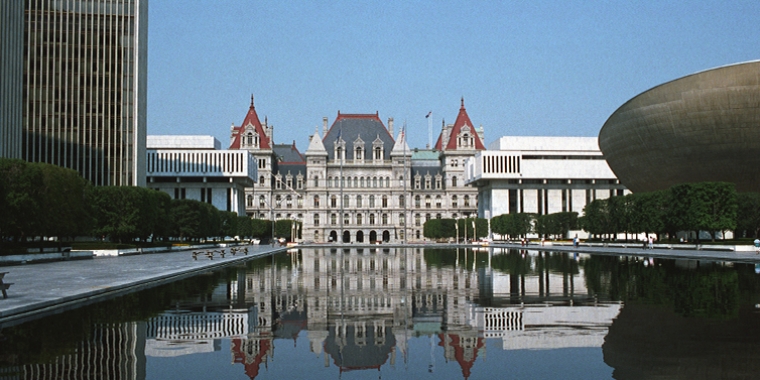
Senate Republicans Request Delay to Implementation of Advanced Clean Truck (ACT) Regulations
October 10, 2024

The impending implementation of the ACT regulation is the latest example of this state under one-party control pushing forward with a mandate without a straightforward and honest cost-benefit analysis.
ALBANY, NY - Today, members of the New York State Senate Republican Conference penned a letter to Governor Kathy Hochul to raise concerns regarding the adoption and impending implementation of the Advanced Clean Truck (ACT) regulations by the Department of Environmental Conservation (DEC).
“The ACT regulations are the latest example of a mandate that was implemented without properly considering the impacts on small businesses, in addition to the lack of adequate infrastructure to meet the intended goals. We have heard from many concerned businesses, and are calling on Governor Hochul to delay the implementation and form a Task Force to hear from stakeholders on a more responsible, practical solution that will work for everyone,” stated Senate Republican Leader Rob Ortt.
The plan, first adopted in 2021 is set to take effect in 2025, would be yet another burdensome mandate on businesses in New York that would contribute to, and further dismantle, the state’s already poor business climate.
“The Senate Republican Conference has been consistent in our support of reasonable and common sense efforts to move our state towards a cleaner energy future, but only if those efforts also protect our economy and our residents. The effective date of ACT fails to do so and is another example of New York State putting the cart before the horse. Just like the illogical effort to ban natural gas and fuel choice, ACT is being implemented too fast and we must come up with a realistic plan that moves our state towards a cleaner future without harming all current New Yorkers,” said Senator Mario Mattera, ranking member of Senate Energy and Telecommunication Committee.
“It has become clear that the Albany Democrat strategy for New York’s energy future is not affordable, feasible, or realistic under its current timeline. The impending implementation of the ACT regulation is the latest example of this state under one-party control pushing forward with a mandate without a straightforward and honest cost-benefit analysis of how much it will cost taxpayers and consumers, the consequences for the state and local economies, its impact on an already burdensome business climate, and whether it will have any effective impact at all on emissions at this time. ACT will triple the cost of a semi-truck, dump truck, and snowplow and reduce the range of these trucks to 150 miles or less requiring four to six hours to recharge. It will negatively impact the desired emission reduction as those owning and operating trucks on the road today will be encouraged to keep their older, dirtier, and less safe trucks, that they would otherwise replace, on the road longer. It also raises the concern that businesses may relocate their trucking fleets out of state since they could continue to operate those trucks in New York,” stated Senator Tom O’Mara, member of Energy and Telecommunications.
“New York State has gotten way ahead of itself with many of its Climate Act mandates and the Advanced Clean Truck regulations are a prime example. Although the requirements are slated to take effect in 2025, the technology and infrastructure are still new and extremely costly. Business owners and transportation companies in my district are extremely concerned about their ability to comply with this premature mandate. I am concerned that this may drive many of them across the state border to Pennsylvania. With every new burden we put on businesses, we are making New York State less competitive. The reasons for the state to hit 'pause' on the ACT implementation and other climate mandates keep piling up,” stated Senator George Borrello, member of the Senate Energy and Telecommunications Committee.
“The ACT regulations are another example of Albany’s ‘green’ agenda run amok. It’s not only costly; it’s infeasible. Zero-emission truck technology is not at a point where businesses can afford to purchase or maintain these vehicles. Instead of forcing businesses to comply with this standard, raising costs on both them and consumers in the process, the governor should delay the implementation of ACT until it’s a more realistic and affordable standard for New Yorkers,” stated Senator Dan Stec, ranking member of the Senate Environmental Conservation Committee.
“I have been in continual contact with Brookhaven Town Highway Superintendent Dan Losquadro, Executive Board Member of the New York State Association of Town Superintendents of Highways, and their unanimous position is that the Advanced Clean Truck (ACT) regulation will be a disaster for every department across the state. I implore the Governor to listen to their concerns and at the very least delay the implementation as vehicles required under these stringent guidelines simply do not exist. This regulation would place undue financial and operational burdens on our highway departments and severely impact their ability to keep our roads clear for motorists and emergency vehicles, " stated Senator Anthony Palumbo, member of the Senate Environmental Conservation Committee.
“At a time when residents are facing increased costs and our state has grown unaffordable for so many, we cannot allow state policies to further increase costs. New Yorkers need financial relief, not additional financial burdens,” stated Senator Patricia Canzoneri-Fitzpatrick, member of the Senate Environmental Conservation Committee.
“As we move towards a clean energy future, legitimate concerns have been raised that New York State is implementing parts of the CLCPA and its climate goals haphazardly. A case in point is the implementation of the ACT regulation, which will have major impacts on numerous communities, businesses and industries in the state and another illustration of why I did not support the CLCPA. My legislation will pause the implementation of this regulation so that we can ensure that those most affected by it are prepared and that the full impact of this directive is known,” said Senator Griffo, member of the Senate Transportation Committee.
Zero emission truck technology is still in its infancy, and the majority of these trucks currently cost three to four times the average of a diesel-powered vehicle. These increased costs will be passed on to taxpayers and consumers throughout the state. In addition, the charging infrastructure needed to power this fleet is not currently available at this time.
The letter points to legislation (S.9910, sponsored by Senator Griffo) that would delay the implementation of ACT regulations, and also requests that a Task Force be formed to conduct a cost-benefit analysis and formulate a more responsible plan, in consultation with the industry, that will both reduce emissions and limit dramatic cost increases for businesses.
“Clean air is a vital resource that our conference has long fought for and believes in protecting. However, like with all facets of governance, we must be prudent about how we achieve those goals. While this regulation is admirable in its intentions, the practical matter is that New York is not currently in a position to adopt it in a manner which is feasible and affordable,” the letter reads.
A full copy of the letter is attached above.
Share this Article or Press Release
Newsroom
Go to Newsroom


